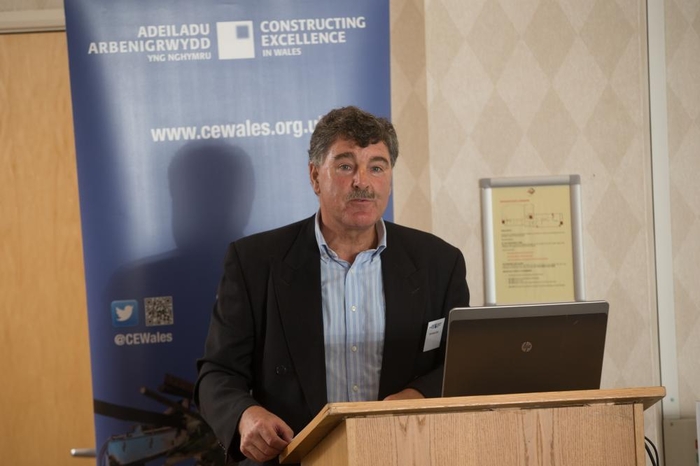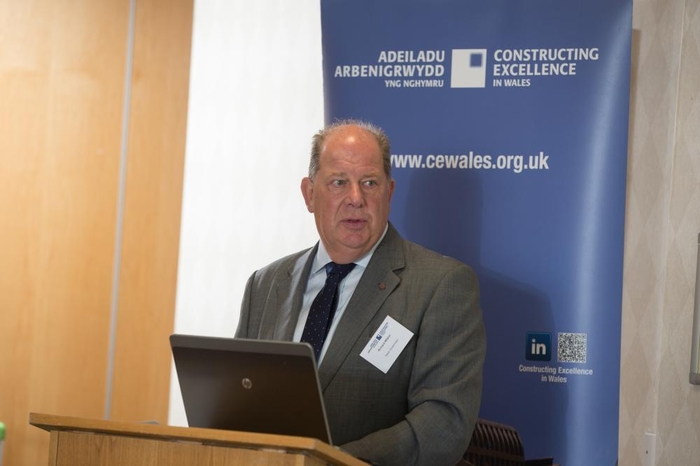|
|
AGM, New Chair and Tough Targets for CEW
 |
CEW continues to cajole, educate, inform and influence key decision makers across the Welsh built environment and is doing so very successfully judging from feedback at the CEW AGM this week. Based on the evidence from the CEW Awards, the principles advocated by CEW are proving that best practice and best value are the only way to build a Wales fit for future generations.
 Rhodri-Gwynn Jones takes over from Richard Wilson - previously director and secretary, Civil Engineering Contractors Association (Wales) Ltd he is a well respected figure in Welsh construction, particularly with regard to infrastructure and is a strong advocate of collaborative working. He is well versed in the politics of construction having gained local government experience with Glamorgan County Council (1973-74), Mid Glamorgan County Council (1974-90), Dyfed County Council (1990-95), Cyngor Sir Ceredigion (1995-2002) and Bridgend County Borough Council (2002-08). He then became director and secretary of the Civil Engineering Contractors Association (Wales) Ltd (2008 - 2016) and a member of the Welsh Government's 1st Construction Sector Panel (2011-2013) and has been on the board CEW (since 2009). He is also chair of the Wales Construction Careers and Skills Provision Advisory Group and the founding chair of the Welsh Construction Federation Alliance (2011-2013). Richard Wilson said:
"Since I became chairman of CEW in 2007 I have seen how our industry has matured, championed the concept of best practice and collaborative working and pursued the goal of value over price. I have seen some fantastic results in terms of projects delivered and a shift in how organisations of all shapes and sizes and roles operate and manage their people. Almost all of this change, growth and success is down to the stakeholders of CEW and people at the sharp end as well as Milica Kitson and her great team. What I have seen in the past ten years has proved to me that Wales needs an organisation with the credibility and expertise of CEW as much now as it did when it started this work more than 12 years ago.”

 |
 |
Is Theresa May Good for Construction?
 |
Senior figures in the industry have given the thumbs up to Theresa May becoming the new Prime Minister.
 The swift resolution to the uncertainty of the Conservative Party leadership and hence who will lead the country in the wake of the referendum has been welcomed by industry, though Theresa May’s stance on issues that will impact on construction and infrastructure are largely unknown. Theresa May, 59, has been home secretary since 2010 and was also minister of women and equalities from 2010 to 2012. She held shadow cabinet positions and has represented the Maidenhead constituency since it was created in 1997. She was also the first female chairman of the Conservative Party, holding the position in 2002 and 2003. Alasdair Reisner, chief executive of the Civil Engineering Contractors Association, said: “A priority for UK industry is a stable government and economy. As such, Theresa May’s likely appointment as prime minister is welcome as it provides certainty instead of indecision during a long leadership election. “It is now time for the government to get back to the day job of running the country, investing in the growth that will protect the economy from the headwinds that have risen since the referendum. There are major decisions to be made now on large infrastructure projects – it is time for our new prime minister to show that the UK is open for business again.” Simon Girling, national chair of the National Federation of Builders, also welcomed the certainty May and a new prime minster would bring. “The sooner we have some semblance of stability the better,” he said. “That way we can get back to focusing on building the homes our country needs, developing home-grown talent and doing this while securing the best value for taxpayers’ money.” Brian Berry, chief executive of the Federation of Master Builders said that he was encouraged by Theresa May's appointment as from a construction industry perspective, Theresa May’s experience at the very highest levels of Government – is just what is needed at a time of economic uncertainty. He added that while he was also encouraged by to hear Theresa May already commit to increasing house building during her time as Prime Minister, there were uncertainties in other areas. "Our biggest reservation would be that, as Home Secretary, Theresa May raised the bar incredibly high for skilled non-EU migrants attempting to enter the country. With a new immigration settlement likely to be introduced as part of our departure from the EU, current policy would most probably exclude the talented tradespeople our sector desperately needs. There’s a real danger Brexit could exacerbate this country’s construction skills crisis and we would urge Theresa May to develop a responsive system of immigration that satisfies the needs of the construction industry.” So what else do we know about the new Prime Minister? Click on the link and see the main story.
 |
 |
Which Construction Summit?
 |
The Midlands Construction Summit is set to return to Coventry Ricoh Arena on the 27 September 2016. For the first time, the Summit will take place alongside the Midlands Construction Expo. The Summit will be tackling issues around the future of the UK construction industry whilst focusing on three intrinsically linked key themes: Image, Skills and Productivity. After the recent Brexit vote, the construction industry is facing considerably uncertain times which is projecting the importance of facing and tackling the issues within the industry. The Midlands Construction Summit will be tackling these themes and exploring how the industry can approach and resolve the pressing issues through an array of guest speakers, including keynote speaker Adrian Belton, Chief Executive of CITB. By attending the Summit, you will be provided with ways to future proof your business. It will also form an outstanding networking opportunity with many of the construction sector’s most influential leaders in attendance. In turn, forming a stronger and more well connected construction industry within the Midlands. The Brexit vote has evoked concern within the industry with it being viewed as a turning point for Britain. Most worryingly for the industry is the effect of migration, or therefore lack of, after the Brexit vote. The industry’s work force is currently made up of 25% EU migrants according to the Builders Merchant Building Index which could have devastating effects on productivity within the industry. The link between use of traditional construction methods and poor productivity within the construction industry is widely acknowledged. Build Off Site have reported that given the complexity of a building site and the unpredictable weather patterns in the UK, building site productivity runs at around 50%. Put in simple terms, this means for every pound of capital, only 50p will be secured in investment value. Construction technology is seeing a major upturn from traditional methods and is moving towards offsite solutions. Architects, manufacturers and software developers are transforming the 21st century building industry with the use of computer aided design, producing prefabricated panel systems and modular volumetric construction – designed and planned using Building Information Modelling – bringing construction into a new collaborative technical era. The advantages of prefabricated building methods heighten the level of accuracy and speed up the building process, allowing less room for error, a reduction in wastage, fewer delays from the weather and therefore a far more productive building site. The efficiencies of offsite go a long way to upturn not only the productivity but also the stereotyped image of the industry. But now the industry has to unite to change perceptions and promote the wealth of career opportunities to attract fresh young talent to shape our townscapes and city skylines – maximising technical innovations, to ensure the industry is future proofed and future ready. At the Midlands Construction Summit, 27 September 2016 at the Ricoh Arena Coventry industry leaders and guest speakers, including Adrian Belton, will gather together to confront issues surrounding the productivity of the industry and inspire you with ways to future proof your business. Tickets cost just £95 plus vat and include; entry into the Midlands Construction Summit, entry into the Midlands Construction Expo, parking, lunch and refreshments throughout. For more information, or to book your place, visit: www.midlandsconstructionsummit.co.uk

 |
 |
Urgent Action Needed on Climate Change
 |
Climate change is already happening with 14 of the hottest summers on record occurring since the year 2000. A new report by the UK's Adaptation Sub-Committee sets out the key risks to the UK - including periods of too much and too little water impacting on flooding and food production, rising sea levels and increasing average and extreme temperatures affecting health and wellbeing. Responding to the UK Climate Change Risk Assessment Evidence Report, Ms Howe says: "More than 60% of people in Wales live and work near the coast, including in all our major cities and many important towns. Already 222,000 homes are at risk of flooding and that figure is likely to increase together with the £200 million estimated cost of putting it right. Flooding and coastal change must be seen as a priority with agencies working together to protect communities. Our infrastructure must be fit-for-purpose and take account of future change including heat and severe weather events. "This report can help to focus and strengthen action and I will be asking public bodies to use it to improve their understanding of the action needed.” "The risks outlined in the report will have to be dealt with and it is far better that we are properly prepared – we must acknowledge and address the risks of climate change including the need to reduce carbon emissions. But the report also outlines some potential opportunities that climate change may bring, such as longer growing seasons and economic opportunities for businesses such as tourism, and I want Wales to be taking action now.”
 Public bodies will need to show how they are supporting a more Prosperous Wales and Resilient Wales, developing a low carbon society, building both resilience and our capacity to adapt to climate change. As part of the new Well-being of Future Generations Act, public bodies will need to take account of the impacts of climate change when developing their well-being objectives, and planning how they deliver services in the long-term in the face of the risks set out in the report. Public services boards will also need to show they are looking at how the changes will impact locally, as they assess the well-being of communities. Global temperatures are breaking all records, and although there is international commitment to reduce emissions to limit temperature increase, action needs to be accelerated both to reduce emissions, in line with the new Environment Act, and to make sure that communities are protected from the impacts of flooding and severe weather. Ms Howe says “Public bodies have a long way to go to understand the urgent steps they have to take to meet these targets. They should be leading the way by ensuring they are reducing emissions across public buildings and land, considering electric vehicles for essential car users and planning all services in a way which thinks about environmental impact now and in the future.” The Health sector has already come together to publish a plan for how it can adapt to climate impacts including overheating in buildings, public transport and risks to healthcare service delivery. Natural Resources Wales also has a key role to play in terms of dealing with individual incidents such as storms as well as tackling underlying trends such as changes in seasonal rainfall. Projects such as Greener Grangetown, being delivered in partnership with Dwr Cymru and City of Cardiff Council, will help to reduce surface water flooding in 575 properties providing 1600m2 of new green space. They also have a growing network of local Flood Wardens whose role is to support local communities across Wales. For further information on the UK Climate Change Risk Assessment Evidence Report please visit https://www.theccc.org.uk/uk-climate-change-risk-assessment-2017
 |
 |
Win £15m Investment in Infrastructure Ideas
 |
Innovate UK, in collaboration with the Knowledge Transfer Network will be hosting a series of events across the UK to discuss the forthcoming competition ‘Infrastructure Systems’. Infrastructure forms the backbone for economic stability, growth, competitiveness and productivity in modern society and is key for social wellbeing and environmental sustainability. Yet these infrastructure systems in the UK, and globally, face increasing social and environmental pressures. As an example, to be successful in the future, cities need to deliver a thriving economy, great quality of life and reduced environmental footprint, whilst managing growing economic, social and environmental stresses.
 Innovate UK are to invest up to £15m in business led, innovative projects in Infrastructure Systems, provisionally including - Solutions for affordable, sustainable and secure energy systems
- Innovative solutions for Nuclear Fission
- Innovative solutions for Offshore Wind
- Solutions for connected transport through the integration of multimodal transportation systems
- Resilience of infrastructure and cities to environmental and societal pressure
- Integrated solutions to systemic challenges in urban areas
Where possible, projects should address more than one of these areas particularly through the introduction of cross-cutting technologies (e.g. digital, sensors, autonomous systems) that can address system integration. The briefing events will include - an opportunity to hear about the scope of the competition in more detail
- an opportunity to network and develop cross sector partnerships for the competition
- an opportunity to meet with InnovateUK for 1 to 1 discussions about the competition
You’ve got to be in it to win it – the next event is on 28 July 2016, runs from 10:30 - 15:00
and is at the SWALEC Stadium, Cardiff, CF11 9XR. These events will benefit businesses, academics, researchers and local authorities involved in energy systems, resilient urban systems, connected transport systems (Autonomous Vehicles not in scope) and pulling in new technologies from digital, communications, sensors, electronics and novel materials sectors. Book your place at https://wales.business-events.org.uk/en/bookbasketitem/32145/
|
|
|
|
|